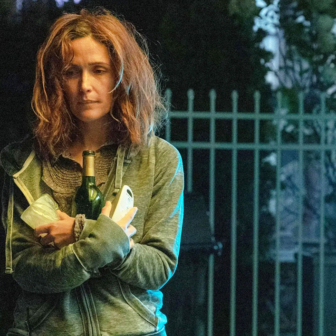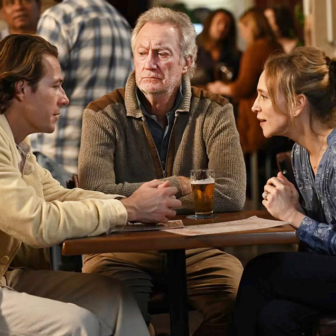Wes Anderson is a filmmaker with a particular sense of time and place, and in his new feature, The Phoenician Scheme, there is much that is familiar. His eye for the beguiling detail, for a distinctive colour palette, for framing and symmetry, for the safety of objects and the embrace of order is evident once more. But part of the significance of the enclosing frame is what it keeps at bay: the best Anderson films also suggest a darker, more chaotic world that lies beyond.
The Phoenician Scheme is set in 1950, and much of it concerns a fictional place, Modern Greater Independent Phoenicia. Benicio del Toro plays Anatole “Zsa-zsa” Korda, robber baron and financial wizard, with powerful enemies who wish him dead or bankrupt, preferably both, and are doing their best to make this happen. He is about to experience his sixth plane crash when we meet him, and he is beginning to have intimations of mortality; the film is punctuated by brief black-and-white scenes in which he sees himself being judged in the afterlife.
In the meantime, however, he has his legacy to think of. Korda — three times a widower, father of nine young sons — is not exactly a family man. He turns to his daughter Liesl (Mia Threapleton), whom he has not seen for six years. When he summons her from the convent where he had deposited her, she is about to take her vows; she agrees to meet Korda only because she wants to confront him with the rumour that he murdered her mother. He denies it, but suggests that he knows who did.
They are a study in contrasts. Korda is dashing, chaotic, wounded, accumulating bruises, bloodstains and bandages as he dodges hit after hit. He’s a man of many words when it suits him, and del Toro delivers his lines with gruff relish. As Liesl, Threapleton (Kate Winslet’s daughter, in her first lead role) has a forceful, upright presence, stoic, impassive, sceptical and precise in a starchy all-white nun’s habit with veil. She is persuaded, however, to join her father on a mission to save his last grand infrastructure project in Phoenicia — with, perhaps a revenge mission to follow.
Anderson has often dealt with families in crisis, with siblings redefining their ties to one another, forceful patriarchs, absent mothers, resentful sons, in everything from The Royal Tenenbaums to The Grand Budapest Hotel, Fantastic Mr Fox to The Darjeeling Limited. In this instance, the father–daughter connection is at the heart of the film, and the shifting relationship between the two is the primary focus. Anderson draws on his evolving repertory company for small roles, and deftly adds Michael Cera to the group, but it is the bond between Korda and Liesl that matters.
The expansive Korda, with his recurring greeting, “Can I offer you a hand grenade?” is a dangerous man at the best of times. He’s an apex predator of capitalism, but Anderson appears to be prepared to cut him some slack. On the scale of charming to monstrous, Korda — named, presumably for Alexander Korda, the legendary British filmmaker — seems to be in the “larger than life” category.
So what exactly is at stake here between father and daughter? There is the mystery of her mother’s fate, among other family matters. There’s the nature of his project, which clearly violates at so many levels Liesl’s sense of what is right; can she be so easily co-opted into his plans? And what should be expected of him in this new relationship? These questions are answered to varying degrees by the end of the film, in a resolution that is a mixture of the sentimental and the satisfying.
Canadian director Matthew Rankin has many ways of explaining the unlikely combination of film traditions and influences in his second feature, Universal Language, which premiered in Cannes at Directors’ Fortnight and won the Bright Horizons award at Melbourne International Film Festival last year.
Iranian cinema emerges out of a thousand years of poetry, Rankin suggests, and Winnipeg cinema emerges out of forty years of discount furniture commercials. It’s an explanation that exemplifies the spirit of what’s going on in Universal Language. The two traditions are combined in glorious, earnest, light-hearted and unexpected ways, in a film that manages to balance quiet absurdity and optimistic warmth.
The combination is at one level quite literal: Rankin and his co-writers Ila Firouzabadi and Pirouz Namati create a world in which Farsi and French are the two main languages of Winnipeg. But this is more than a cinematic twist or comic combination. Above all, the Winnipeg of Universal Language is a place in which everything is connected.
As we follow several characters making their way through the city, the connections are not immediately obvious. There is the melancholy figure of Matthew (played by Rankin), who returns from Montreal to Winnipeg to visit his mother, only to find that she is no longer in the home he grew up in. There are two determined schoolgirls, Negin and Nazgol (Rojina Esmaeili and Saba Vahedyousefi), who set out to help their friend find his missing glasses and stumble across a tantalising solution, a banknote frozen in the ice. There is Massoud (played by co-writer Nemati), a tour guide escorting groups around the sights of Winnipeg, which include an abandoned briefcase with a World Heritage listing, and a carpark that was the site of the Great Parallel Parking Incident of 1958. And a missing prize turkey also has a significant part to play in the narrative.
Gradually the strands come together in ways that feel deeper than coincidence or convenience. Some of the links are comical, some intricate and surprising. Crucial ones are revealed, others are buried deeper in the fabric of the film. The desire for and necessity of connection is what gives Universal Language both its lightness and its gravity. •




